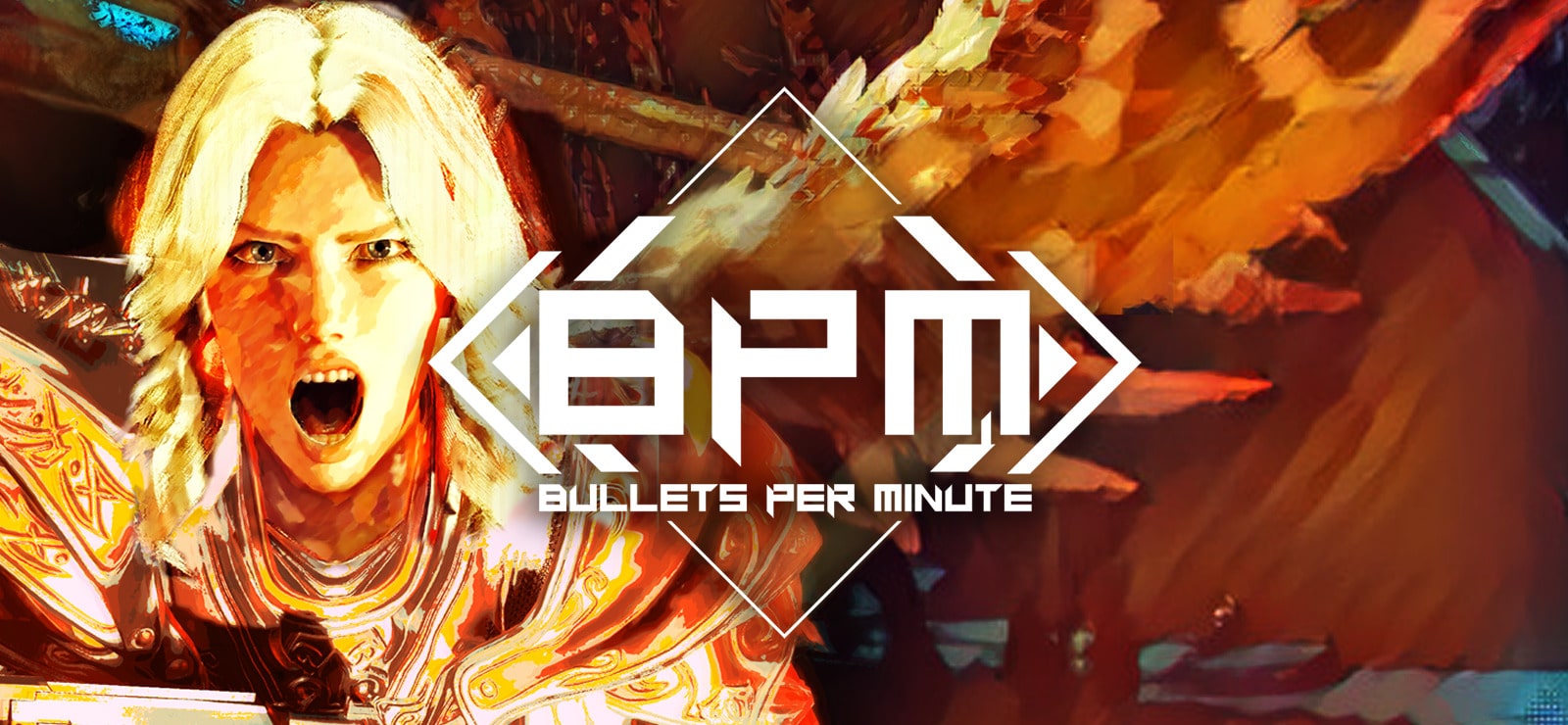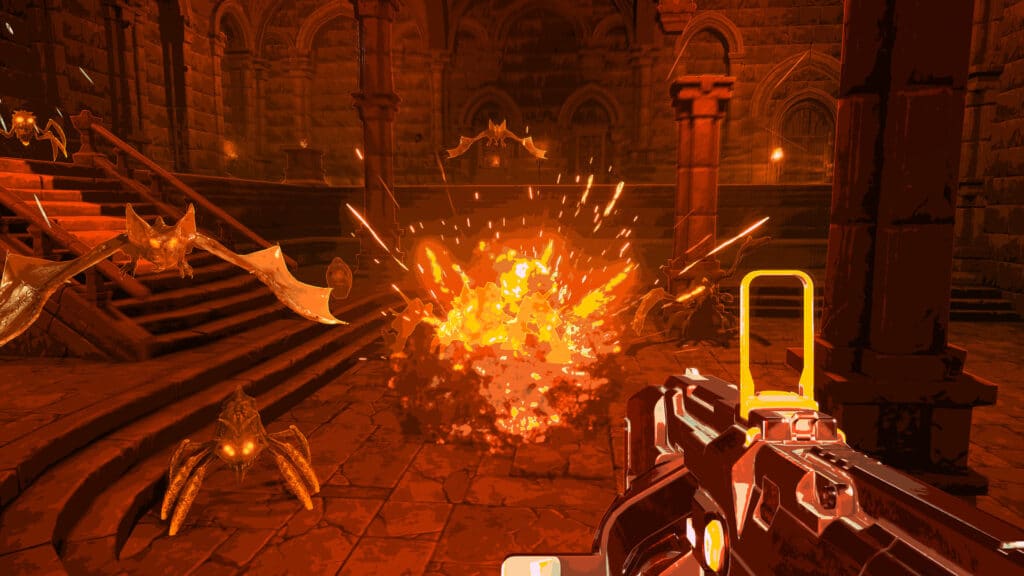

In a lot of my reviews, I talk about the power small developers have. Something like BPM: Bullets Per Minute simply wouldn’t work as a AAA title, except here the unique idea offers endless potential. By tying all the mechanics to rhythm, players need to change how they approach situations and think about combat. It’s enough to bring an FPS master to their knees or leave a rhythm game fan stunned. However, this in turn makes for a rather divisive experience. Having put in some time, is BPM: Bullets Per Minute a must, or does it simply resonate with a certain group of people?
Unlike most games, BPM: Bullets Per Minute starts with a calibration test. It plays like a typical rhythm game, the icon goes across the screen and you input the command at a specific time. After that, there is a hearing test where you need to do it based on sound alone. Based on your performance BPM: Bullets Per Minute will calculate what your latency is and select one of the three-timing options. If you disagree with the choice or simply want more leeway, these can be changed at any time in the settings.
From there, BPM: Bullets Per Minute tells you absolutely nothing about your adventure. This would matter more if you could select anything besides Göll and one of the four difficulties. The other characters are locked behind specific tasks, progression-based accomplishments or random tasks.


While you learn this over time, each character has its own gimmick, weapon set, and distinct advantages and disadvantages. Göll is obviously the ‘newcomer friendly’ character, with the next character, Freyr, offering a lot of power at the cost of very limited health. Some of the later characters change how BPM: Bullets Per Minute works, like Skuld, has a lot of health and a good weapon, though she needs kills to maintain her health.
Before worrying about future problems, players need to first master all that BPM: Bullets Per Minute has to offer. Initial runs are similar to a Soulsborne game. You’re never really sure what anything does, resulting in a lot of trial and error. Sometimes it works out, other times you screw yourself, with this information making later runs a little easier.
One thing that eventually becomes apparent is that everything follows the beat. Attacks, timing, your actions, everything. It will likely take a few runs to get used to multiple inputs to reload a gun or how to time attacks based on patterns. Upon mastering these mechanics there is a sense of it all clicking that can feel really satisfying.
Over time it starts to get easier, with previously fearsome enemies being a couple of moves from death. However, given this is a roguelike, don’t be surprised if runs are somewhat inconsistent. Sometimes you’ll get great gear and other runs will feel impossible. Thankfully, what BPM: Bullets Per Minute tries to do works extremely well due to the music.
For a gimmick, BPM: Bullets Per Minute understands it needs to feel satisfying and make sense. I can absolutely say that there are all kinds of audio cues, the music matches what is about to go on and even defeating powerful guardians can create its own momentum. With sound being the emotional side of things, it’s easy to feel engrossed by the experience, assuming you can stomach it.
Outside of having an extremely steep learning curve and lots of esoteric elements, BPM: Bullets Per Minute is really hard to look at. It reminds me of the same concerns people had with the short-lived Virtual Boy. Everything has a strong red hue, coupled with oversaturated scenes and a weird filter that can easier make players sick (see image above). This can be lessened, either through changing settings or the television itself but it is not fun to play long term. Some of the challenges exasperate these problems by making the core issues more pronounced. Classic mode is a great example of this, which can be seen below.
Controls can also be rather rough with a controller. As the image above suggests, it plays very similar to arena shooters like Doom. It can be hard to pinpoint enemies, maintain the beat and avoid taking damage, often resulting in a domino effect. A mistake is made, causing a second mistake to happen, ending with you taking damage. With even low-level enemies having the ability to drop you in two hits, the margin of error is really high and it can be stressful to play.
BPM: Bullets Per Minute : The hard thing about BPM: Bullets Per Minute is that it can be a lot of fun, it just doesn't have mass appeal. A lot of players will be turned off by the design choices, low-budget look, and steep learning curve. Those who put in the time might enjoy it if only for the novelty, it just depends on how it resonates. At most I appreciate the thought that went into the gameplay loop. Lesser games have implemented unique concepts that feel like a gimmick, whereas this feels like a legitimate effort to make a unique concept work. For this BPM: Bullets Per Minute should be praised, it just still can't overcome the other lesser parts that bring it down. – Grant
[Editor’s Note: BPM: Bullets Per Minute was reviewed on PlayStation 5 and a copy was provided to us for review purposes.]
Tons of Warhammer PC games are currently offered with steep discounts on multiple online retailers…
Neil Druckmann, the Creative Director for The Last of Us series, has recently confirmed that…
Spider Man 2 still remains a very sloppy release on PC. Instead of properly fixing…
More than 70% of online only titles have been scrubbed away from earth. Some PC…
Warhammer 40.000: Rites of War is currently free on GOG. PC gamers remember how amazing…
Bandai Namco and FromSoftware's upcoming game, Elden Ring Nightreign, is making some waves as official…